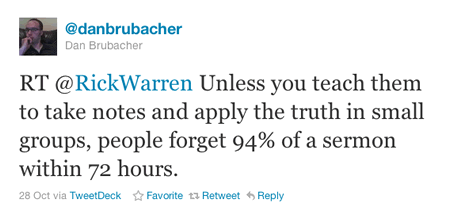Forget Remembering: Aiming for More in Preaching

It all started with a tweet:

I know what this tweet is getting at, and there’s an element of truth here. But I disagree with the premise of the tweet: that our goal in hearing a sermon should be to remember the content. I replied:
@danbrubacher I’m not sure it’s as important to remember a sermon as to be changed by it on the spot
And that got the ball rolling.
This is kind of a sore point for me, because I keep hearing people criticize the idea of preaching by making statements like, “I can’t remember most of the sermons I’ve heard.” Me either. I can’t even remember most of my own sermons. If this is the measure of a successful sermon, then preaching is simply not worth it.
It’s also wrong because I think it aims at the wrong goal. I’m teaching a course in homiletics right now. I can tell you exactly what I don’t want the students to do: to get me to remember their outline and most of the content. A sermon should aim to do something, and most of the time that’s not it.
There are really two types of preaching:
Preaching that delivers content and application – Preaching that aims low is focused on content. It takes the Bible and tries to communicate that material in a way that’s understandable and memorable. It then gives a number of applications and sends the listener home.
If you try to do this type of preaching, then getting people to remember the sermon is important. If they don’t remember your content, and if they don’t apply the lessons, then your sermon has been a failure.
This type of preaching is common. I’m going to argue that it’s not the type of preaching we need.
Preaching that shapes the mind and causes a shift in worldview – In his brilliant essay “The Danger of Practical Preaching” Lee Eclov writes:
The Bible spends much more time on shaping the spiritual mind than commanding particular behavior. We need far more training in the ways of grace, of spiritual perceptions, and of what God is really like, than we do in how to communicate with our spouse. Understanding the glory of Christ is far more practical than our listeners imagine. Properly preached, every sermon based on a passage of Scripture is fundamentally practical.
We don’t primarily need content. We need something deeper: we need our minds reshaped to see the world the way that it really is. The content is meant to get us here. Darrell Johnson puts it this way in his excellent book The Glory of Preaching

:
Through text after text, sermon after sermon, the risen Jesus, by the Holy Spirit, causes a shift in worldview. He causes a shift out of any frame of reference with the self or humanity at the center to a frame of reference with the risen and ascended Jesus at the center. He causes a shift to a Christocentric vision of the cosmos, “wherein Christ is the ontological, epistemological, and soteriological focus of all human thought and experience” (Michael P. Knowles). Oh, Lord, may it be so.
The question here moves from “Can you remember my sermon?” to “Do you see the world differently?” If my worldview shifts, I’ll remember that a lot longer than I’ll remember mere content. And, as Eclov points out, this is much more practical in the end than preaching that only tries to be practical. Ironically, it is not a sermon that ignores content; it simply aims to do more with that content.
Here’s another way to put it. Tim Keller talks about preaching that changes people in their seats. Here are some notes from a summary of his teaching:
I have to see Jesus to change me. When you see Jesus in a new way or sense his salvation this will change you on the spot…
In the sermon there is an act of worship. God takes the word of the preacher and gives a person a vision of Jesus that shapes the heart on the spot. We are looking for a divine supernatural light. You can know honey is sweet without tasting it. But we need the sense of the sweetness – give them a taste of Jesus and you will see them change on the spot.
To use that illustration from Jonathan Edwards, the goal isn’t to describe the sweetness of honey, but to get them to taste it for themselves. If you describe honey, they’ll forget it; if they taste the honey, they won’t forget any time soon.
Here are a couple of quotes from D. Martyn Lloyd-Jones on the subject (emphasis mine):
Much more important than the words is the Spirit, the life; in Christ we are being taught, and built up in Him. So that in a sense, though you may forget the words, you will have received the life, and you go out aware of the life of God, as it were, pulsating within you.
The first and primary object of preaching is not only to give information. It is, as Edwards says, to produce an impression. It is the impression at the time that matters, even more than what you can remember subsequently. In this respect Edwards is, in a sense, critical of what was a prominent Puritan custom and practice. The Puritan father would catechize and question the children as to what the preacher had said. Edwards, in my opinion, has the true notion of preaching. It is not primarily to impart information; and while you are writing your notes you may be missing something of the impact of the Spirit. As preachers we must not forget this. We are not merely imparters of information.






